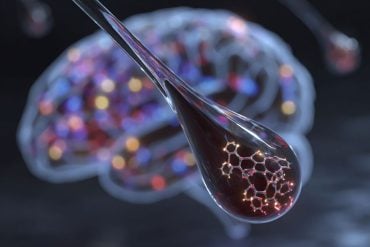Summary: Children born to mothers diagnosed with anemia before the 31st week of pregnancy were at a higher risk of developing ADHD, ASD, and other intellectual disabilities than children born to mothers diagnosed with anemia during the final weeks of pregnancy. The risk of being diagnosed with autism was 4.9% higher for those born to mothers who experienced early pregnancy anemia. For ADHD, those born to anemic mothers had a 9.3% higher risk than those born to mothers who developed the condition during late pregnancy.
Source: Karolinska Institute
The timing of anemia, a common condition in late pregnancy, can make a big difference for the developing fetus, according to research at Karolinska Institutet published in JAMA Psychiatry. The researchers found a link between early anemia and increased risk of autism, ADHD and intellectual disability in children. Anemia discovered toward the end of pregnancy did not have the same correlation. The findings underscore the importance of early screening for iron status and nutritional counseling.
An estimated 15-20 percent of pregnant women worldwide suffer from iron deficiency anemia, a lowered ability of the blood to carry oxygen that is often caused by a lack of iron. The vast majority of anemia diagnoses are made toward the end of pregnancy when the rapidly growing fetus takes up a lot of iron from the mother.
In the current study, the researchers examined what impact the timing of an anemia diagnosis had on the fetus’ neurodevelopment, in particular, if there was an association between an earlier diagnosis in the mother and the risk of intellectual disability (ID), autism spectrum disorder (ASD) and attention-deficit/hyperactivity disorder (ADHD) in the child.
Overall, very few women are diagnosed with anemia early in pregnancy. In this study of nearly 300,000 mothers and more than half a million children born in Sweden between 1987-2010, less than 1 percent of all mothers were diagnosed with anemia before the 31st week of pregnancy. Among the 5.8 percent of mothers who were diagnosed with anemia, only 5 percent received their diagnosis early on.
The researchers found that children born to mothers with anemia diagnosed before the 31st week of pregnancy had a somewhat higher risk of developing autism and ADHD and a significantly higher risk of intellectual disability compared to healthy mothers and mothers diagnosed with anemia later in pregnancy. Among the early anemic mothers, 4.9 percent of the children were diagnosed with autism compared to 3.5 percent of children born to healthy mothers, 9.3 percent were diagnosed with ADHD compared to 7.1 percent, and 3.1 percent were diagnosed with intellectual disability compared to 1.3 percent of children to non-anemic mothers.
After considering other factors such as income level and maternal age, the researchers concluded that the risk of autism in children born to mothers with early anemia was 44 percent higher compared to children with non-anemic mothers, the risk of ADHD was 37 percent higher and the risk of intellectual disability was 120 percent higher. Even when compared to their siblings, children exposed to early maternal anemia were at higher risk of autism and intellectual disability. Importantly, anemia diagnosed after the 30th week of pregnancy was not associated with a higher risk for any of these conditions.
“A diagnosis of anemia earlier in pregnancy might represent a more severe and long-lasting nutrition deficiency for the fetus,” says Renee Gardner, project coordinator at the Department of Public Health Sciences at Karolinska Institutet and the study’s lead researcher.
“Different parts of the brain and nervous system develop at different times during pregnancy, so an earlier exposure to anemia might affect the brain differently compared to a later exposure.”
The researchers also noted that early anemia diagnoses were associated with infants being born small for gestational age while later anemia diagnoses were associated with infants being born large for gestational age. Babies born to mothers with late-stage anemia are typically born with a good iron supply unlike babies born to mothers with early anemia.

Although the researchers couldn’t disentangle anemia caused by iron deficiency from anemia caused by other factors, iron deficiency is by far the most common cause of anemia. The researchers say the findings could be the result of iron deficiency in the developing brain and may thus support a protective role for iron supplementation in maternity care. The researchers emphasize the importance of early screening for iron status and nutritional counselling but note that more research is needed to find out if early maternal iron supplementation could help reduce the risk of neurodevelopmental disorders in children.
Adult women typically need 15 mg of iron per day, though needs may increase later in pregnancy. Since excessive iron intake can be toxic, pregnant women should discuss their iron intake with their midwife or doctor.
Funding: The research was supported by grants from the Swedish Research Council and from the Strategic Research Area Neuroscience at Karolinska Institutet.
Source:
Karolinska Institute
Media Contacts:
Press Office – Karolinska Institute
Image Source:
The image is in the public domain.
Original Research: Open access
“Association of Prenatal Maternal Anemia With Neurodevelopmental Disorders”. Aline Marileen Wiegersma, Christina Dalman, Brian K. Lee, Håkan Karlsson, Renee M. Gardner.
JAMA Psychiatry doi:10.1001/jamapsychiatry.2019.2309.
Abstract
Association of Prenatal Maternal Anemia With Neurodevelopmental Disorders
Importance
Given the critical role that iron plays in neurodevelopment, an association between prenatal iron deficiency and later risk of neurodevelopmental disorders, such as autism spectrum disorder (ASD), attention-deficit/hyperactivity disorder (ADHD), and intellectual disability (ID), is plausible.
Objective
To test the a priori hypothesis that anemia diagnosed in mothers during pregnancy is associated with an increased risk of ASD, ADHD, and ID in offspring and that the magnitude of the risk varies with regard to the timing of anemia in pregnancy.
Design, Setting, and Participants
This cohort study used health and population register data from the Stockholm Youth Cohort to evaluate 532 232 nonadoptive children born from January 1, 1987, to December 31, 2010, in Sweden, with follow-up in health registers until December 31, 2016. Data analysis was performed from January 15, 2018, to June 20, 2018.
Exposures
Registered diagnoses of anemia during pregnancy. Gestational timing of the first recorded anemia diagnosis (≤30 weeks or >30 weeks) was considered to assess potential critical windows of development.
Main Outcomes and Measures
Registered diagnoses of ASD, ADHD, or ID or co-occurring combinations of these disorders.
Results
The cohort included 532 232 individuals (272 884 [51.3%] male) between 6 and 29 years of age at the end of follow-up (mean [SD] age, 17.6 [7.1] years) and their 299 768 mothers. The prevalence of ASD, ADHD, and ID was higher among children born to mothers diagnosed with anemia within the first 30 weeks of pregnancy (4.9% ASD, 9.3% ADHD, and 3.1% ID) compared with mothers with anemia diagnosed later in pregnancy (3.8% ASD, 7.2% ADHD, and 1.1% ID) or mothers not diagnosed with anemia (3.5% ASD, 7.1% ADHD, and 1.3% ID). Anemia diagnosed during the first 30 weeks of pregnancy but not later was associated with increased risk of diagnosis of ASD (odds ratio [OR], 1.44; 95% CI, 1.13-1.84), ADHD (OR, 1.37; 95% CI, 1.14-1.64), and ID (OR, 2.20; 95% CI, 1.61-3.01) in offspring in models that included socioeconomic, maternal, and pregnancy-related factors. Early anemia diagnosis was similarly associated with risk of ASD (OR, 2.25; 95% CI, 1.24-4.11) and ID (OR, 2.59; 95% CI, 1.08-6.22) in a matched sibling comparison. Considering mutually exclusive diagnostic groups, we observed the strongest association between anemia and ID without co-occurring ASD (OR, 2.72; 95% CI, 1.84-4.01). Associations of these disorders with anemia diagnosed later in pregnancy were greatly diminished.
Conclusions and Relevance
In contrast to maternal anemia diagnosed toward the end of pregnancy, anemia diagnosed earlier in pregnancy was associated with increased risk of the development of ASD, ADHD, and particularly ID in offspring. Given that iron deficiency and anemia are common among women of childbearing age, our findings emphasize the importance of early screening for iron status and nutritional counseling in antenatal care.






